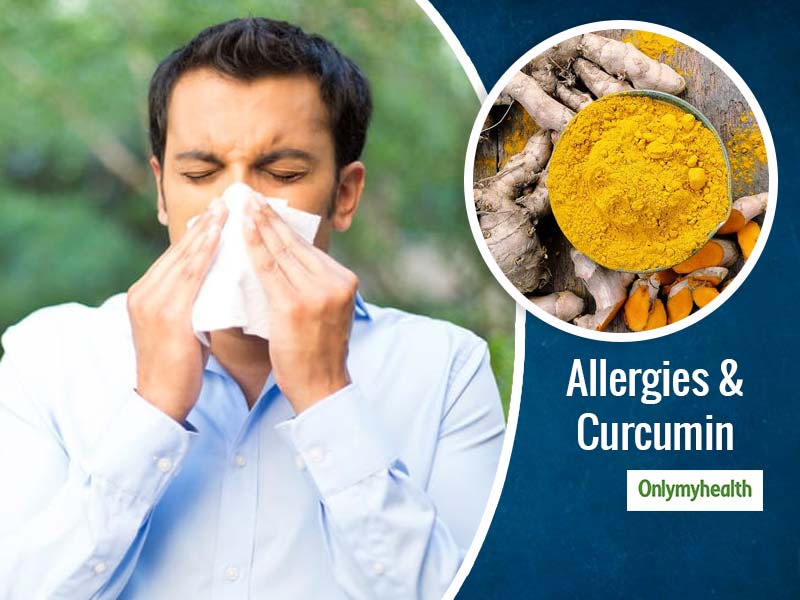
In allergy, our body’s immune system reacts to allergens such as pollens, foods, some pets, and house dust mites. However most people don’t face any problem, their body doesn’t react to allergens pose but people who are allergic or prone to it, their immune system takes them as a menace and thus produces a problematic response. To prevent the outset of allergies, curcumin, the main component of turmeric, has substantiated to be beneficial. Dr Saurabh Arora, Inventor of SNEC30, Arbro Pharmaceuticals, said, “To counter the symptoms of allergy, curcumin is long-known to provide relief from various health concerns. It has anti-inflammatory, anti-allergic and immuno-modulatory properties without posing any adverse effects.”
Table of Content:-

Also Read: Curcumin For Cancer: Understanding How Curcumin Can Help Prevent Cancers
Signs And Symptoms Of Allergy
Following are some signs and symptoms of allergy that one needs to know for probable treatment:
- Runny and itchy nose
- Sneezing associated with itchy red eyes.
- Redness of skin and rashes
- Excessive cough, wheezing, and shortage of breath
- Nausea, vomiting, abdominal discomfort and diarrhea
Risk Factors Associated With Allergies
There are certain risk factors related to allergies are as following:
- Age – Younger children have a higher risk to suffer from these allergies as compared to adults; though as they grow older, many of them outgrow these allergies.
- Family History of Asthma or allergies – Heredity can be a factor as people with a family history of asthma or allergies are more prone to develop these allergies.
- Personal History of Asthma or allergies – An allergic reaction to a thing or asthma in your past could increase the risk of you getting affected by other allergies as well.
Effects Of Curcumin On Allergies
Curcumin helps to balance immunity - Curcumin has properties that aids in the modulation of our immune system . Curcumin can amend the immune response, which prevents hypersensitivity reactions. The hypersensitive reaction of the immune system can undoubtedly lead to allergies and curcumin helps to balance these reactions.
Curcumin reduces histamine release and acts as a decongestant - High potent form of Curcumin behaves as a decongestant and anti-histamine that diminish mast cell degranulation which leads to release histamine. Therefore it can doctor chronic as well as acute allergies effectively.
Curcumin works as an inflammatory mediator inhibitor – Curcumin an inflammatory mediator inhibitor acts as natural leukotriene for allergic reactions. It thus assists in allergic respiratory conditions such as bronchial asthma and other lung problems.
Curcumin reduces inflammation – Curcumin; a constituent of turmeric plays a very significant role in reducing inflammation. Curcumin is also highly responsible for reducing inflammation in asthma. Curcumin shows the inhibitory response to Notch-GATA signalling pathway, likewise suppressing the activity of nuclear factor, Kappa B, a master protein for regulating inflammation. Moreover, curcumin helps in easing the inflammation by creating a balance of T helper cells which is an essential member of our immune system. These actions not only control hypersensitivity instead manage various biochemical agents to control inflammation. Indeed, Curcumin averts narrowing of airways and excellently reduce bronchial inflammation
Curcumin has an anti-oxidant effect – Allergies in our body catalyst an inflammatory reaction. Curcumin helps in rummaging free radicals that associate to inflammation and therefore helps in diminishing allergies.
Curcumin works as anti-allergen – It enables to decrease mucus generation, and its anti-allergic properties help to lessen the occurrence of allergy-induced asthma.

Curcumin acts as an anti-microbial agent – Curcumin also has an anti-microbial and antiseptic effect. It has an inbuilt ability to resist bacterial and viral infections. It is as effective as antibiotics and helps eliminate respiratory infections which can lead to asthma attacks.
Read more articles on Other Diseases
How we keep this article up to date:
We work with experts and keep a close eye on the latest in health and wellness. Whenever there is a new research or helpful information, we update our articles with accurate and useful advice.
Current Version

